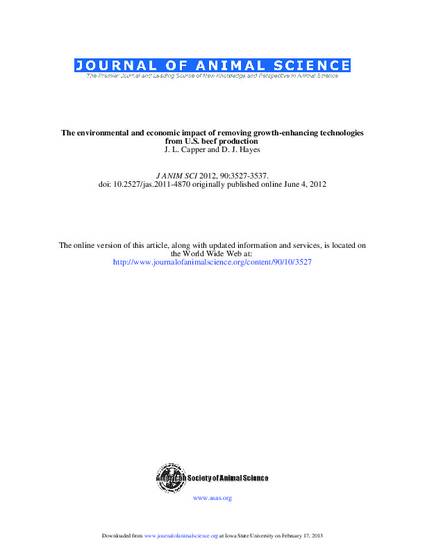
The objective of this study was to quantify the environmental and economic impact of withdrawing growth-enhancing technologies (GET) from the U.S. beef production system. A deterministic model based on the metabolism and nutrient requirements of the beef population was used to quantify resource inputs and waste outputs per 454 × 106 kg of beef. Two production systems were compared: one using GET (steroid implants, in-feed ionophores, in-feed hormones, and beta-adrenergic agonists) where approved by FDA at current adoption rates and the other without GET use. Both systems were modeled using characteristic management practices, population dynamics, and production data from U.S. beef systems. The economic impact and global trade and carbon implications of GET withdrawal were calculated based on feed savings. Withdrawing GET from U.S. beef production reduced productivity (growth rate and slaughter weight) and increased the population size required to produce 454 × 106 kg beef by 385 × 103 animals. Feedstuff and land use were increased by 2,830 × 103 t and 265 × 103 ha, respectively, by GET withdrawal, with 20,139 × 106 more liters of water being required to maintain beef production. Manure output increased by 1,799 × 103 t as a result of GET withdrawal, with an increase in carbon emissions of 714,515 t/454 × 106 kg beef. The projected increased costs of U.S. beef produced without GET resulted in the effective implementation of an 8.2% tax on beef production, leading to reduced global trade and competitiveness. To compensate for the increase in U.S. beef prices and maintain beef supply, it would be necessary to increase beef production in other global regions, with a projected increase in carbon emissions from deforestation, particularly in Brazil. Withdrawing GET from U.S. beef production would reduce both the economic and environmental sustainability of the industry.
Available at: http://works.bepress.com/dermot_hayes/2/

This article is from Journal of Animal Science 90, no. 10 (October 2012): 3527–3537, doi:10.2527/jas.2011-4870.